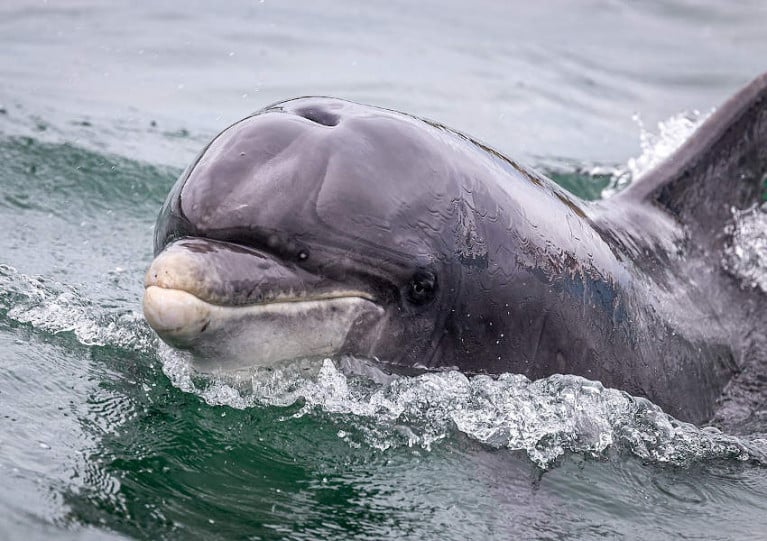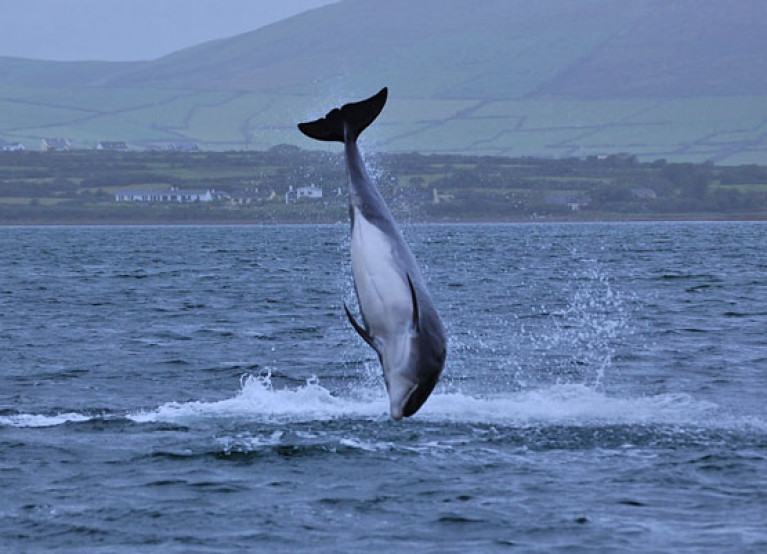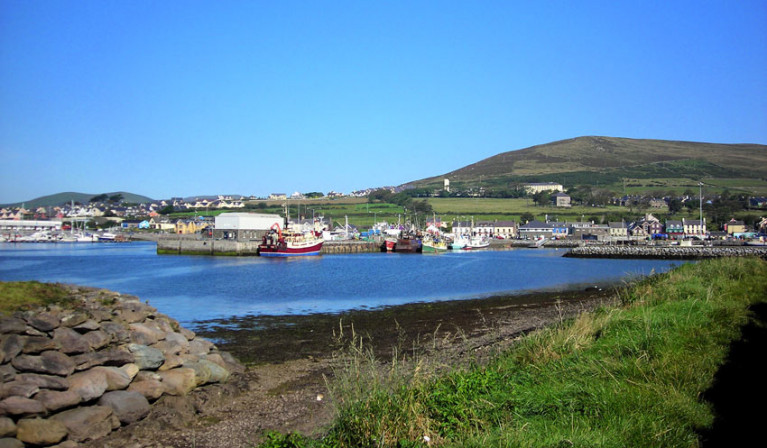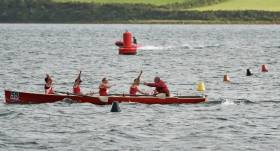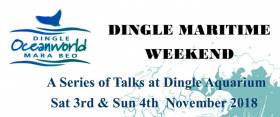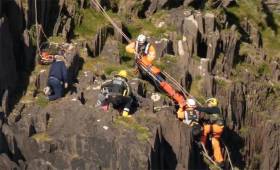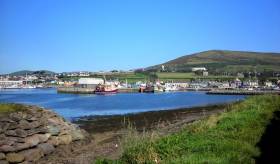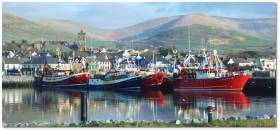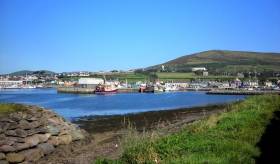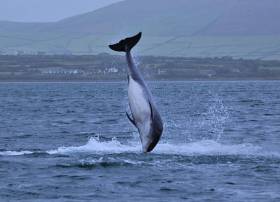Displaying items by tag: Dingle
’No News Is Good News’ as Hunt for Missing Dolphin Fungie Pauses Amid Poor Weather
Poor weather off the Kerry coast has put on hold the search for Fungie the dolphin who has been missing from his Dingle home for almost a week, according to the Guardian.
Yesterday, Sunday 18 October, RTÉ News reported that divers from Mallow Search and Rescue has joined the search to explore coves around Dingle Harbour amid growing concern for Fungie’s wellbeing.
The bottlenose dolphin has been resident in the village harbour since 1983, rarely straying far from its environs — and never for this length of time.
There was an unconfirmed report of a sighting last Thursday, as local fisherman Gary Hand suggested the marine wildlife favourite was feeding with other dolphins further out in Dingle Bay.
That’s one of the theories being shared by local boatmen — some of whom also suggest that the solitary Fungie may be in hiding from dolphin pods and whales encroaching on his usual inshore waters.
“There’s still hope,” said boatman Gary Brosnan. “If Fungie has died there’s a good chance we’d have found him in one of the inlets or caves. No news is good news.”
Dingle boatmen have a number of theories re Fungie’s disappearance:
— Seán Mac an tSíthigh (@Buailtin) October 19, 2020
Theory 1: Fungie has gone out to sea following feed. An easterly wind off the land tends to drive sprat and other feed away from the coast. Possible, but Fungie has never been missing this long. 1/4... pic.twitter.com/gPyhH3KehC
‘Missing’ Fungie Reportedly Resurfaces In Dingle Bay
Reports of the disappearance of Dingle’s resident dolphin Fungie this week appear to have been greatly exaggerated, as a cetacean matching his description was spotted by a local fisherman.
Paul Hand tells RTÉ News that he is “one thousand percent certain” the bottlenose dolphin that followed his boat into Dingle Bay yesterday (Thursday 15 October) was Fungie, who has made his home in the Co Kerry village since the early 1980s.
Fungie aroused some concern on Wednesday when he failed to appear as usual in the harbour, with unusual movements said to be “unlike him”.
But Hand suggests the dolphin has simply been following boats out into the bay and staying to feed and spend time with a pod of his own kind — following a lonely summer in the absence of the area’s usual tourist trade.
RTÉ News has more on the story HERE.
Dingle Harbour Facilities Set To Reopen By This Weekend
The Department of Agriculture, Food and the Marine (DAFM) has confirmed that bathroom and shower facilities at Dingle’s harbour and marina will reopen by the coming weekend.
Marina users had expressed dismay that facilities at the fishery harbour had remained under lock and key, despite reports of no such restrictions on similar service blocks at other marinas frequented by cruisers along the coast.
In a statement to Afloat.ie, DAFM — which operates Ireland’s six Fishery Harbour Centres — said it was “not in a position to open the marina facilities in Dingle until such a time as appropriate cleaning services could be engaged to meet with the current safety guidelines” amid the coronavirus pandemic.
However, the department says the situation has now been resolved and the facilities will be open for the coming weekend.
Myross Come out on Top at All-Ireland Coastal Championships
#Coastal Rowing: Myross carried off the senior men’s title at the All-Ireland Coastal Rowing Championships in Dingle. Sneem won the women’s senior title. Kerry club, Workmen’s, did very well in women’s events, as did Kilmacsimon in men’s. Hundreds of crews competed in the event, which was run alongside Dingle Regatta. The Heritage class gave crews from Dublin a chance to shine. The women from St Michael’s and the men from Dalkey won the senior Heritage titles and the mixed title went to Stella Maris.
All Ireland Coastal Rowing Championships (ICRF), Dingle (selected results; winners)
Men
Senior: Myross
Seine Boat: Sneem
Open Classic: Myross.
Heritage, Senior: Dalkey. Inter: Stella Maris. Novice: Sive. Under-18: Valentia.
Masters: Kilmacsimon Quay
Intermediate: Kilmacsimon Quay
Novice: Templenoe
Junior: Kilmacsimon Quay
Under-21: Callinafercy
Under-18: Templenoe
Women
Senior: Sneem
Heritage Senior: St Michael’s. Under-18: Callinafercy A.
Open Classic: Castletwonbere
Masters: Workmen’s
Novice: Myross
Junior: Fossa
Under-21: Workmen’s
Under-18: Workmen’s A
Mixed
Senior: Workmen’s B
Masters: Templenoe
Heritage: Stella Maris
Dingle Maritime Weekend to Feature Ted Creedon on 3rd & 4th November
Dingle Maritime Weekend, an annual event jointly organised by Kevin Flannery of the town’s renowned Oceanworld, and former Harbour Master Captain Brian Farrell (he played a key role in the establishment of the biennial Dun Laoghaire to Dingle Race in 1993), will this weekend offer an intriguing range of sea-related topics in a series of talks and inter-active events – all staged in Oceanworld, and all free writes W M Nixon
With the October Bank Holiday just completed, Dingle – which is Europe’s most westerly port – is seeing a slight change of direction, after a festive long weekend in which the noted Dingle hospitality experience, combined with its musical and entertainment traditions, set a light-hearted tone.
The Dingle Maritime Weekend, while not totally in contrast in that it firmly believes in making visitors welcome, adopts a more educational tone, and gets underway at 1400 hrs on Saturday 3rd November with a talk by Daitihi de Mordha, the former Director of The Blasket Centre from Dun Chaoin in the far west of the Dingle Peninsula, on a shipwreck of 1818 which was the cause of much conflict at the time.
Saturday’s programme is completed at 1530 by piracy historian Des Ekin, whose new book on true-life pirate stories from 30 Irish ports might surprise people as they learn of the murky pasts of what are now notably respectable seaside towns and ports all round our coast.
On Sunday the star speaker at 1130 hrs is noted journalist, broadcaster and local historian Ted Creedon, who presentation will be based around the evolution of the Coastguard Service on the Dingle Peninsula, an area so remote from much of Ireland that inevitably they developed their own very effective ways of dealing with special local conditions.
The still-disputed story of a violent event of the distant past is discussed at 1230 by Dr Conor Brosnan, who has worked as a GP in Dingle for 20 years. “The Massacre at Dun an Oir 1580” was a grisly episode at nearby Smerwick Harbour during the Demond Rebellion in November 1580, and it’s an event which has been analysed in many ways, but is always ripe as the topic for a lively discussion.
It also brings the historical side of the Dingle Maritime Weekend agenda to a close, as the final presentation on Sunday afternoon, 4th November at 1530, is very much for children and about our future, though doubtless, adults will find it of much interest. “How to be an Ocean Hero” by Louise Overy is an interactive talk and multi-themed workshop in which she aims at enticing young people into the exciting world of marine science, which - for the Ireland of today and tomorrow and into the years ahead - becomes ever more important.
Dingle Maritime Weekend 3rd-4th November 2018
All events are at Dingle Oceanworld
Saturday 3rd November 14.00 hrs: DAITHI DE MORDHA: “Bad na nGort nDubh 1818 – Tragedy, Conflict and Loss in West Kerry”.
Saturday 3rd November 15630 hrs: DES EKIN: “The Pirate Trails of Ireland”
Sunday November 4th 1130 hrs: TED CREEDON: "The Evolution of the Coastguard of the Dingle Peninsula, 1821-1922”
Sunday November 4th 1230hrs: Dr CONOR BROSNAN: “The Massacre at Dun an Oir, 1580”
Sunday NOVEMBER 4th 1430 hrs: FOR CHILDREN: LOUISE OVERY: “HOW TO BE AN OCEAN HERO”
Video Of Coastguard Cliff Rescue In Dingle
#Coastguard - The Irish Coast Guard’s Facebook page has shared video of a dramatic cliff face rescue near Dingle earlier this week.
Dingle Coast Guard and the Irish Coast Guard’s Shannon-based helicopter Rescue 115 joined paramedics at the scene where a person has fallen around 10 metres down the cliff face on Monday 30 April.
Rescue climbers from the Dingle coastguard unit were able to reach the causality and transfer them to the helicopter for treatment at University Hospital Kerry.
Video of the rescue was captured from the water by Jeannine Masset, a longtime fan of Dingle’s resident dolphin Fungie.
Dredging Works At Dingle Fishery Harbour Centre
#MarineNotice - Dredging works were set to commence this week at Dingle Fishery Harbour Centre and are expected to be ongoing until the end of February 2018.
The works will involve the dredging of the north/south section of the main navigation channel and an area between the breakwaters off the main quay head.
The vessel Grete Fighter (Callsign: OZLP2) and the jack-up barge Yo Yo will be onsite and will maintain a VHF watch on Channel 16/14.
Three Special Mark (monitoring buoy) Fl Y 2s will be in positions 150 meters east, west and south of the north/south channel within the fishery harbour centre.
The Grete Fighter will be transiting to an approved dumpsite east of Beenban Head marked by four special marks.
Port hand marks and leading lights will be affected during the course of the works.
For safety reasons, mariners are requested to proceed slowly and with caution when in the vicinity of the dredging vessels in the fishery harbour centre and to give the works a wide berth.
Contact details and co-ordinates of the dump area are included in Marine Notice No 53 of 2017, a PDF of which is available to read or download HERE.
Dingle Maritime Weekend: October 28th-29th 2017
Dingle today is closely associated with superb hospitality, good food, the sporting entertainment of the biennial Dun Laoghaire to Dingle Race, and the eternal sense of the nearby presence of the mighty Atlantic in one direction, and majestic mountains soaring to the peak of Mount Brandon in the other. Thus it is easy to overlook the fact that this remote yet spirited and independent port has a long history of interacting with the sea for fishing, international trade, and other intriguing activities writes W M Nixon.
The annual Dingle Maritime Weekend in the October Bank Holiday Weekend has been running for six years now to increase awareness of Dingle’s often colourful maritime past. It was established by Kevin Flannery of Dingle Oceanworld and former Harbour Master Captain Brian Farrell (whose tour of duty did so much to bring the harbour to its present healthy state), and the idea is to exlore aspects of that rich heritage, and how it relates to Dingle’s fascinating maritime environment today.
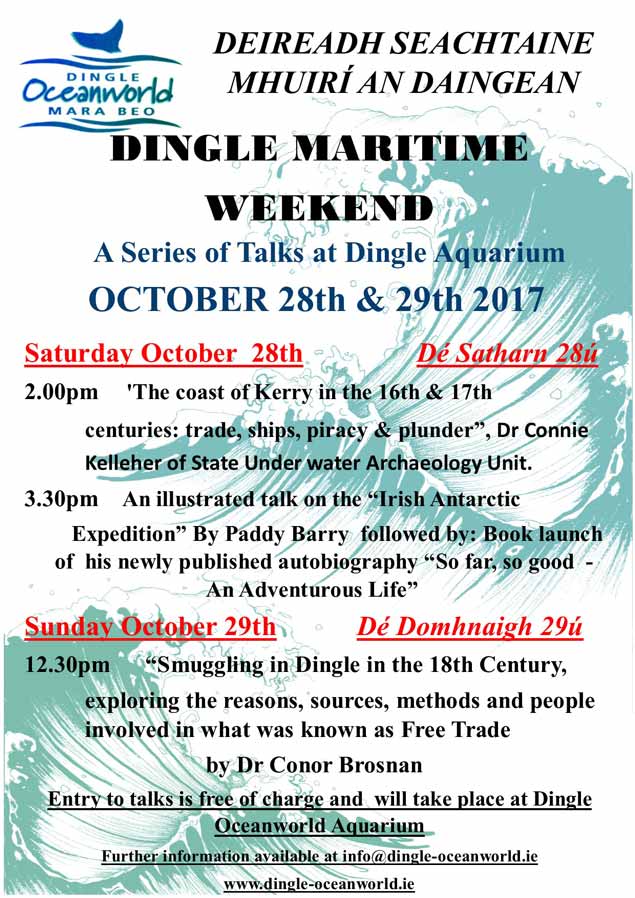
It’s held at the Oceanworld Aquarium and admission is free for three special talks spread in civilized style between the Saturday afternoon and early Sunday afternoon. Thus it’s a user-friendly format which means you can combine the usual multi-activity Dingle holiday weekend with some digestible maritime information. But of course with the varied audience which it usually attracts, all sorts of post-presentation conversations can happily arise.
Dingle Maritime Weekend Programme, 28th and 29th October 2017 at Oceanworld Aquarium
SATURDAY 28th OCTOBER 14:00hrs
'The coast of Kerry in the 16th and 17th centuries: trade, ships, piracy and plunder.'
by Dr Connie Kelleher
The talk will draw on sources such as the High Court of Admiralty Papers, State Papers and other contemporary sources to illustrate episodes when the expansion of maritime empires meant that the diversity of goods traded encouraged smuggling, piracy and corruption. It will show that harbours like Dingle, Ventry and Valentia, rather than being remote, formed part of a network central to this global development in commercial shipping, colonial enlargement and associated growth in opportunistic plunder.
DR CONNIE HELLEHER is a member of the State Underwater Archeology Unit in the National Monuments Service Department of Culture, Heritage and the Gaeltacht. Connie is a graduate of UCC with an MA in maritime archaeology and a PhD from Trinity College Dublin on the history and archaeology of piracy in Irish waters in the early 17th century. As a commercially trained diver, her work with the NMS is broad and focuses on the protection of Ireland's underwater cultural heritage. She is visiting lecturer in underwater archaeology in the Archaeology Dept UCC and is a Board member of the international advisory council on underwater archaeology. With several papers and chapters published on piracy in Irish waters, she is currently putting the final edit to her book: “Ireland's Golden Age of Piracy”.
SATURDAY 15:30 hrs
Irish Antarctic Expedition.
PADDY BARRY will give an illustrated talk on the Irish Antarctic Expedition which followed the survival route of Shackleton & Tom Crean by sea in a small boat and then over the mountains of South Georgia.
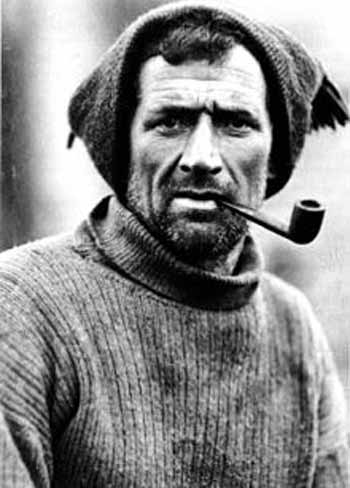 The national hero from the Dingle Peninsula – Tom Crean in the Antarctic.
The national hero from the Dingle Peninsula – Tom Crean in the Antarctic.
Tom Crean came from Annascaul on the Tralee to Dingle road, and is one of the Dingle Peninsula’s most internationally-noted historic figures (another is film star Gregory Peck).
Paddy Barry is a Civil Engineer, now retired, who has, during his working life, taken many 'career breaks' to sail to out of the way places, while at the same time somehow maintaining domestic relations on the home front. He lives in Monkstown, Dublin and has worked, apart from Ireland, in the UK, the USA, Malawi and Ethiopia. His first 'big' trip was to America, in the Galway Hooker ' Saint Patrick', followed in the same boat by journeys to Spitsbergen and later to North West Greenland.
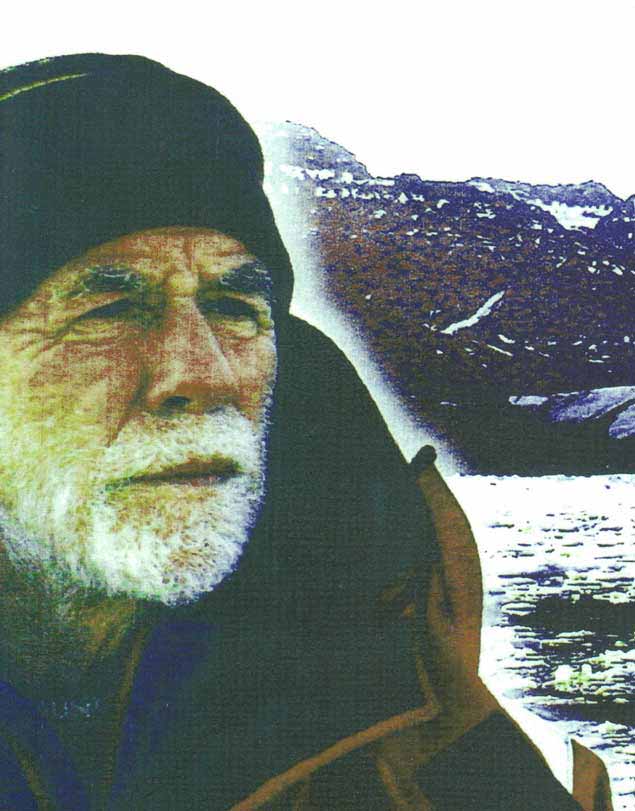 High latitudes voyager and explorer Paddy Barry will celebrate the Dingle Peninsula’s links to Tom Crean
High latitudes voyager and explorer Paddy Barry will celebrate the Dingle Peninsula’s links to Tom Crean
In a very much smaller boat he was Skipper of the Irish Antarctic team which followed in the wake of Shackleton's small boat journey. In 2001 he was Expedition Leader of the team who traversed the North West Passage in the vessel 'Northabout'.
Paddy in his sailing boat Ar Seachrán escorted Camino Thar Sáile on its first year of voyaging across the Irish Sea and the Channel to Europe.
Paddy’s talk will be followed by the Kerry Launch of his newly published autobiography, “So Far, So Good – An Adventurous Life”. Available to purchase here.
SUNDAY 29th October 12:30hrs
Smuggling in Dingle in the Eighteenth Century
Speaker Dr Conor Brosnan
DR CONOR BROSNAN will discuss smuggling in Dingle in the eighteenth century. He will explore the reasons, sources, methods and people involved in what was known as Free Trade. He will talk on the methods the authorities used to suppress smuggling and the legacy it left.
Dr Conor Brosnan is a local GP and a member of Dingle Historical Society. He has a deep interest and knowledge of the Dingle area and its history.
Marine Notice: Site Investigation Works At Dingle Fishery Harbour Centre
#MarineNotice - Site investigation works are being carried out at Dingle/An Daingean Fishery Harbour Centre in Co Kerry, according to the latest Marine Notice from the Department of Transport, Tourism and Sport.
The works involve the drilling of multiple boreholes at locations, subject to minor variations, as indicated by the co-ordinates and map included in Marine Notice No 37 of 2016, a PDF of which is available to read or download HERE.
Drilling was expected to begin yesterday (Monday 5 September) and will finish on or around Friday 28 October, weather permitting.
A jack-up barge will be moved to the various borehole locations by the tug Samson (Callsign ZQVL6) and will remain on site overnight during the operations.
All appropriate lights will be displayed by the barge at night. Radio navigation warnings will be transmitted on VHF Channel 16 throughout the works.
Fungie The Dolphin Wounded By Propeller Blade
#Fungie - Dingle's resident dolphin Fungie has sustained a significant wound below his dorsal fin, as the Irish Examiner reports.
The deep cut, likely inflicted by a visiting boat's propeller, was noticed yesterday (Friday 3 June) by fans of the popular marine wildlife attraction who's delighted locals and visitors alike in Dingle for more than 30 years.
However, Fungie lovers have been urged not to panic – as the famous bottlenose has healed well from similar injuries before, and has already returned to frolicking with boaters in Dingle Harbour.
The Irish Examiner has more on the story HERE.


























